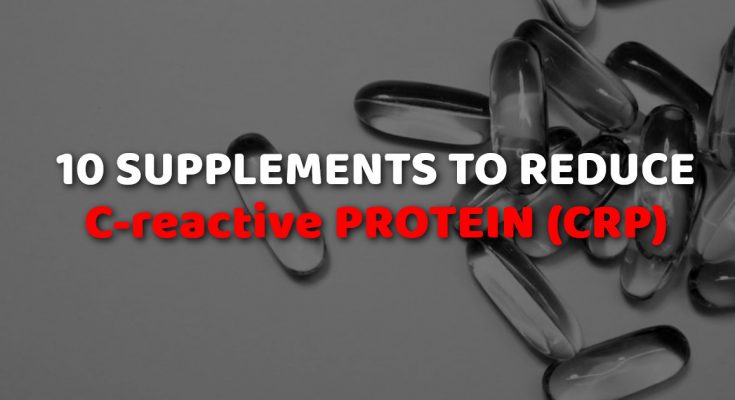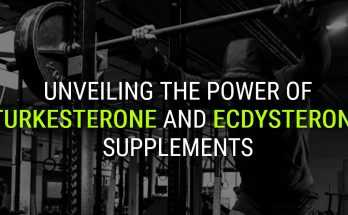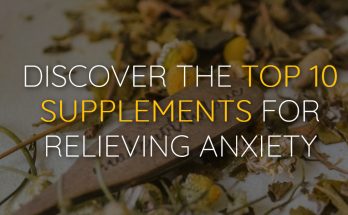Inflammation is a natural response by our bodies to infection or injury, but when it becomes chronic, it can contribute to the development of various diseases.
One key marker of inflammation in the body is C-reactive protein (CRP).
C-reactive protein (CRP) is a molecule released by the liver in response to inflammation, making it a key indicator of systemic inflammation.
Elevated CRP levels are associated with increased risk of developing chronic diseases such as cardiovascular disease.
In this article, we explore ten supplements which have been shown to reduce C-reactive Protein (CRP) levels and support overall well-being.
1. Curcumin
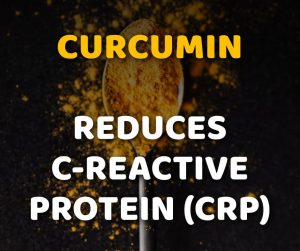
Turmeric (Curcuma longa), a golden spice widely used in traditional Indian and Asian cuisines, has a long-standing reputation for its multifaceted medicinal properties.
Deep within its vibrant yellow color lies curcumin, a compound with potent anti-inflammatory effects.
Studies show that curcumin supplementation can significantly lower CRP levels.
An updated meta-analysis of randomized controlled trials published 2022 attempted to clarify the efficacy of curcumin supplementation in lowering the concentrations of CRP and hs-CRP in patients with autoinflammatory conditions.
The meta-analysis concluded:
Curcumin consumption resulted in a reduction of hs-CRP in a non-linear fashion with stronger effects with less than 2000 mg curcumin per day.
Curcumin seems to be beneficial in decreasing the hs-CRP and CRP levels in proinflammatory settings. – [1]
Recommended Product: Turmeric Zooki (Liposomal Curcumin)
2. Magnesium
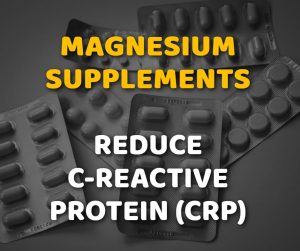
Magnesium is involved in over 600 enzymatic reactions in the body, including those that regulate inflammation.
One nutrient that often goes unnoticed in the battle against chronic inflammaton is magnesium.
This humble mineral not only plays a crucial role in our overall health, but also possesses exceptional anti-inflammatory properties.
Studies have shown that an adequate intake of magnesium can help suppress the production of pro-inflammatory cytokines, which are responsible for triggering inflammation.
A meta-analysis of randomized controlled trials published 2022 summarized the effects of magnesium supplementation on inflammatory parameters.
The meta-analysis concluded:
Mg supplementation significantly decreased serum C reactive protein (CRP) and increased nitric oxide (NO) levels.
In conclusion, Mg supplementation may significantly reduce different human inflammatory markers, in particular serum CRP and NO levels. – [3]
Recommended Product: Together Health – Marine Magnesium From Mineral Salts
3. Omega-3 Fatty Acids
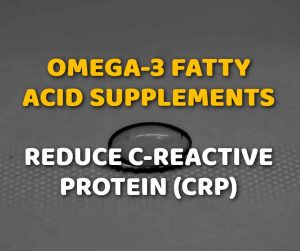
Omega-3 fatty acids are known to possess potent anti-inflammatory properties, making them indispensable in the fight against inflammation.
EPA and DHA work by suppressing the production of pro-inflammatory molecules in the body, resulting in a balanced immune response.
Additionally, these superhero fats also enhance the production of anti-inflammatory molecules, further dampening the flames of inflammation.
While fatty fish like salmon, mackerel, and sardines are excellent sources of EPA and DHA and plant-based sources such as flaxseeds, chia seeds, and walnuts for providing short-chain ALA.
For those seeking an extra boost, Omega-3 supplements provide a convenient option, ensuring an adequate intake of these all-important essential fats.
The current scientific literature has found:
Our findings demonstrated that the n-3 PUFA supplementation significantly reduced serum C-reactive protein (CRP).
The current umbrella meta-analysis found that supplementation of n-3 PUFAs in adults can improve CRP, TNF-α, and IL-6 concentrations under various health conditions. n-3 PUFAs can be recommended as adjuvant anti-inflammatory agents. – [4]
We concluded that omega-3 supplementation leads to a significant decrease in serum levels of CRP and hs-CRP. – [5]
Omega-3 showed promising effects on systemic inflammation by reducing CRP levels in COVID-19 patients. – [6]
4. Quercetin
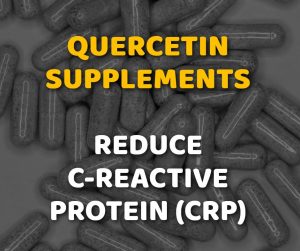
Quercetin is a naturally occurring flavonoid found abundantly in fruits, vegetables, and certain beverages like green tea and red wine.
Quercetin’s anti-inflammatory effects are primarily attributed to its ability to inhibit the production and release of pro-inflammatory molecules, such as cytokines and histamines.
Numerous studies have highlighted the potential of quercetin to combat inflammation by suppressing the production of inflammatory cytokines.
A systematic review and meta-analysis published 2017 aimed to quantify the net effect of quercetin on circulating CRP concentrations.
The systematic review and meta-analysis concluded:
Our findings showed a significant effect of quercetin supplementation on the C-reactive protein-especially at doses above 500 mg/day and in patients with CRP <3 mg/l. – [7]
5. Alpha-Lipoic Acid
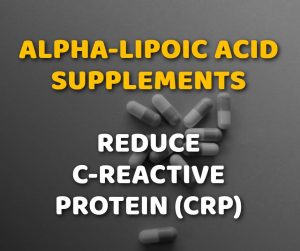
Alpha lipoic acid (ALA) is an antioxidant that boasts unique properties.
Unlike many other antioxidants, ALA is both fat and water-soluble, allowing it to exert its effects in a variety of tissues and cellular compartments.
ALA not only neutralizes harmful free radicals but also regenerates other antioxidants like vitamins C and E, extending their life cycle.
The key to ALA’s anti-inflammatory prowess lies in its ability to modulate various inflammatory pathways.
Through its action on nuclear factor-kappa B (NF-kB), a master regulator of inflammation, ALA inhibits the production of pro-inflammatory molecules such as cytokines.
The latest scientific evidence has found:
This meta-analysis provided evidence of the positive effect of ALA on the reduction of the blood CRP level.
The subgroup analysis and meta-regression results indicated that ALA can reduce the CRP level when administrated at a 600 mg dose, and not in higher or lower doses.
Also, a shorter duration of study positively correlates with the reduction of CRP after ALA supplementation. – [8]
In summary, the current meta-analysis demonstrated the promising impact of ALA administration on decreasing inflammatory markers such as CRP, IL-6 and TNF-α among patients with MetS and related disorders. – [9]
6. Probiotic Supplements
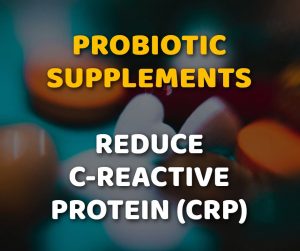
A healthy gut microbiome plays a crucial role in controlling inflammation.
Imbalances in the gut microbiota can result in an overactive immune response, leading to chronic inflammation.
Probiotic supplements containing beneficial bacteria can restore the gut’s balance, improve digestion, and lower CRP levels, ultimately promoting overall well-being.
The meta-analysis indicated a significant reduction in serum CRP following probiotic administration.
This meta-analysis suggests that probiotic administration may significantly reduce serum CRP while having no significant effect on serum IL10 and TNF-α. – [10]
7. Vitamin C
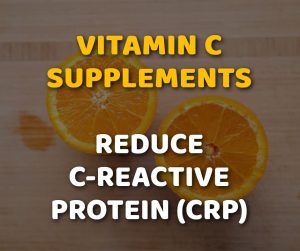
Vitamin C as an essential nutrient acts as a powerful antioxidant, neutralizing harmful free radicals that contribute to inflammation.
Oxidative stress can be a huge contributor to chronic inflammation in the body.
Multiple studies have shown that vitamin C can effectively reduce CRP levels.
The latest scientific evidence on Vitamin C supplements and inflammatory biomarkers such as CRP has found:
The present meta-analysis shows that vitamin C supplementation reduces serum CRP level, particularly in younger subjects, with higher CRP baseline level, at a lower dosage and intravenous administration. – [11]
In conclusion, supplementation with vitamin C might have a significant effect only on CRP reduction. – [12]
Recommended Product: Acerola Cherry Extract Capsules – (Providing 218mg natural Vitamin C per capsule)
8. Ginger
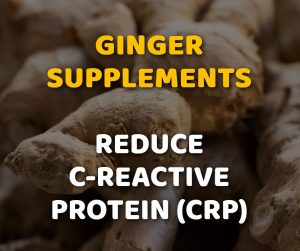
Ginger (Zingiber officinale) has a long traditional history of being used for its medicinal properties, including its anti-inflammatory effects.
Ginger contains phenolic compounds such as gingerol and shogaol, which possess potent anti-inflammatory properties
Numerous studies have found that ginger root extract supplements can effectively reduce CRP levels and aid in the management of inflammatory disorders.
A summary of the latest scientific evidence on Ginger supplements and inflammation has concluded:
This meta-analysis suggests that ginger supplementation significantly reduces serum CRP and improves glycaemia indexes and lipid profile. – [13]
Pooled findings of the five RCTs demonstrated that ginger supplementations had significantly reduced hs-CRP.
The meta-analysis shows that ginger supplementations reduced inflammatory parameters in patients with T2DM. – [14]
Pooled results of this study indicated a statistically significant effect of ginger on serum CRP, TNF-α, IL-6, TAC, and MDA levels following ginger supplementation in compared to the controls.
This current analysis indicates that ginger supplementation has a significant effects on serum inflammatory and oxidative stress markers. – [15]
9. Coenzyme Q10
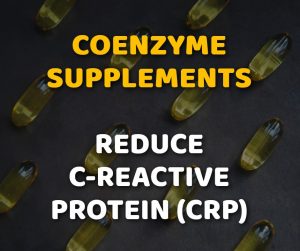
Coenzyme Q10 (CoQ10) is a natural compound found in every cell of the body, renowned for its powerful antioxidant and anti-inflammatory properties.
As an essential component of the energy production process at the cellular level, CoQ10 acts as a potent free-radical scavenger, neutralizing harmful molecules that contribute to inflammation.
One area where CoQ10 shines is cardiovascular health.
Chronic inflammation is a leading contributor to heart disease, and research indicates that CoQ10 can mitigate inflammation in the cardiovascular system, ultimately reducing the risk of cardiac events.
By reducing CRP levels, CoQ10 may help prevent the development and progression of atherosclerosis and other heart conditions.
A GRADE-Assessed systematic review and updated meta-Analysis of randomized controlled trials published 2023 assessed the efficacy and optimal dose of CoQ10 supplementation on inflammatory indicators in the general population.
The systematic review and meta-analysis concluded:
CoQ10 supplementation can significantly reduce the levels of circulating CRP.
This meta-analysis provides evidence for CoQ10 supplementation to reduce the level of inflammatory mediators in the general population and proposes that daily supplementation of 300-400 mg CoQ10 show superior inhibition of inflammatory factors. – [16]
10. Zinc
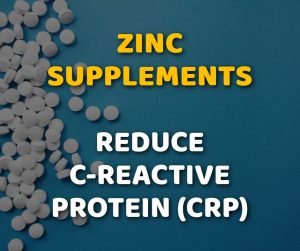
Zinc, an essential mineral, is renowned for its diverse roles within our bodies.
Notably, zinc plays a significant role in regulating the immune system and controlling inflammation.
Adequate zinc levels have been associated with lower CRP levels, suggesting a potential therapeutic role in reducing inflammation.
Studies have shown promising results when it comes to the influence of zinc supplementation on CRP levels.
A meta-analysis and systematic review published 2021 evaluated the impact of zinc supplementation on inflammatory markers, acute-phase reactants, and serum zinc level during inflammatory and infectious diseases.
The meta-analysis and systematic review concluded:
This meta-analysis shows that zinc supplementation improves CRP levels in adults and pregnant women.
It might have modulatory effects on cytokine secretions and blood cells in inflammatory and infectious diseases. – [17]
References
[2] Effect of magnesium supplements on serum C-reactive protein: a systematic review and meta-analysis
The information in this article has not been evaluated by the FDA and should not be used to diagnose, cure or treat any disease, implied or otherwise.
Always consult with a qualified healthcare professional before making any significant dietary or lifestyle changes including supplements and herbs.
